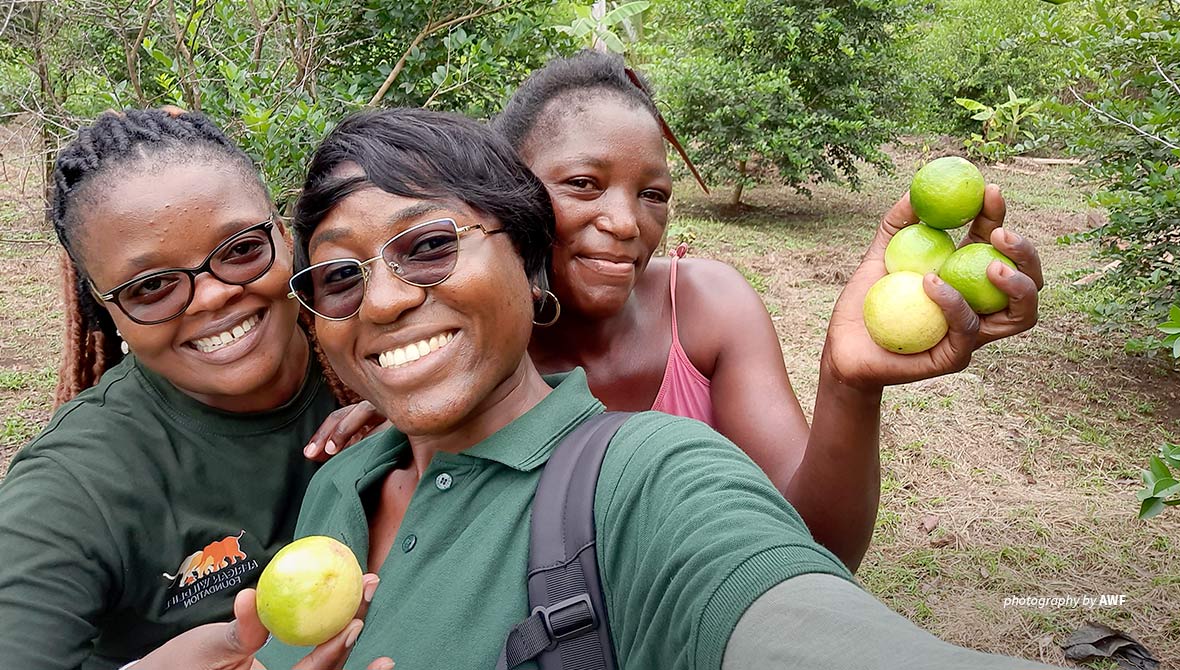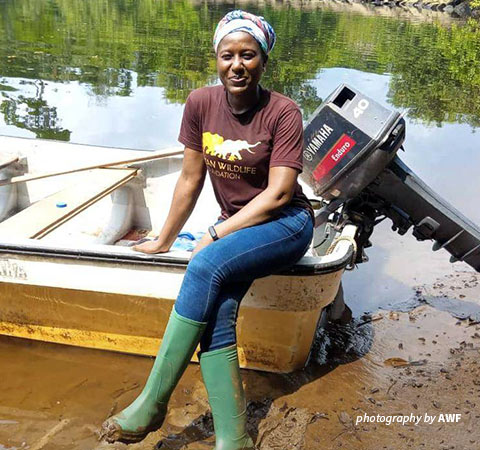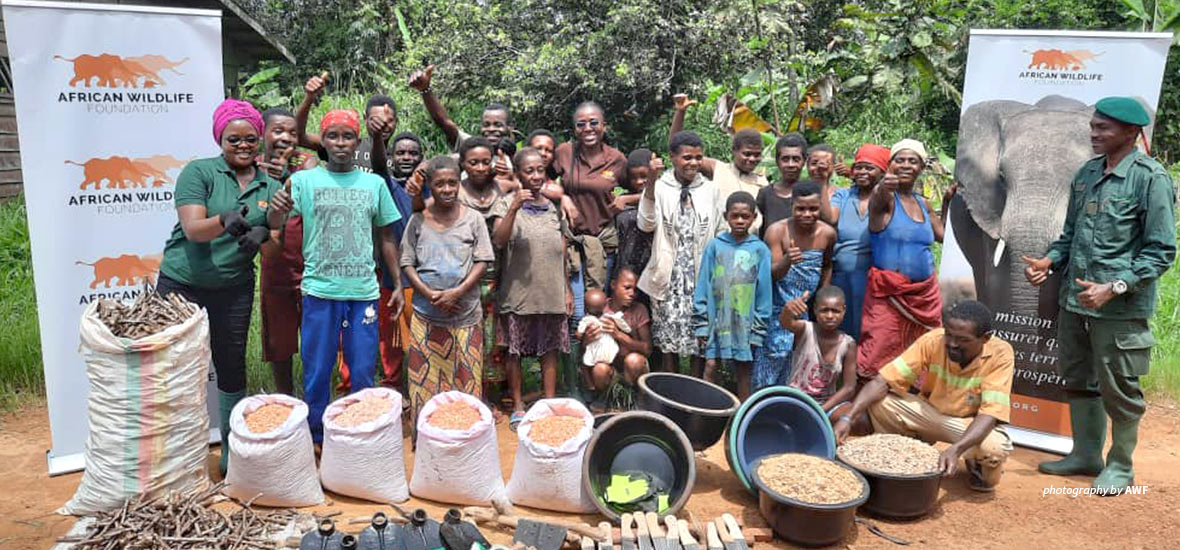Diversifying food systems to combat food insecurity for Indigenous communities in Cameroon

AWF's Amandine Laure Toumbou Nouazi (middle) is a trained hydrobiologist helping indigenous communities adopt sustainable agriculture in Campo Ma'an
Chance Conservationists is a series highlighting AWF staff who have embraced people-centered conservation in their professions despite coming from diverse academic fields. These remarkable individuals now espouse conservation values to propel the organization’s vision for sustainable development and biodiversity protection.
As African Wildlife Foundation’s Community Development Officer in Cameroon, Amandine Laure Toumbou Nouazi engages local communities living around the Campo Ma’an National Park to tackle illegal wildlife trade and overexploitation of natural resources in the landscape.
Amandine holds a Master of Science in Hydrobiology and Environment and a Bachelor of Science in Animal Biology from the University of Yaoundé. Before joining AWF in 2021, she worked with the Zoological Society of London to implement alternative livelihood projects for community engagement for wildlife conservation around the Dja Faunal Reserve. She was among the Top 100 Young African Conservation Leaders in 2021, recognized for contributing to protecting wildlife through community engagement. In this article, she shares insights into her work in Campo, where she helps the indigenous Bagyeli community to adopt sustainable farming methods and alleviate food insecurity — all while protecting the forest landscape sustainably.

AWF Community Development Officer Amandine Laure Toumbou Nouazi
When did you transition from hydrobiology to community-based conservation?
I love animals. My favorites are giraffes, gorillas, elephants, and manatees. Moving from a “traditional” science background to working with communities was quite a smooth transition for me, contrary to my fears. Very early in my career, while carrying out biomonitoring missions in the Lake Ossa Wildlife Reserve in Cameroon’s Littoral region, I saw the negative impact that human practices like poaching and deforestation were causing on the reserve, such as loss of habitats and wildlife reduction.
I understood that there was no need to counter these harms alone when I could educate, sensitize, and invite the local populations to join the struggle. I began small, with students from the local school, sharing knowledge on conservation education and, after that, leading them into the communities to advocate for the protection of the manatees, the flagship species of the area. Looking back, I feel community-based conservation chose me and not the other way around.
How is AWF diversifying food systems to combat food insecurity for indigenous communities?
Among the Bantu groups in the Campo Ma’an landscape, farmers and local communities have practiced agriculture by planting and harvesting crops for decades. But these methods are relatively new to the Bagyeli indigenous people, who, until recently, lived on hunting and gathering edible foods from the forest.
Food was a game of chance. Moreover, if gathering failed, they often turned to hunting for the illegal bushmeat trade as an alternative. AWF is adopting community-based conservation to enhance food security for the Bagyeli through implementing sustainable development activities, including the introduction of agricultural practices such as community plantations and distributing improved seeds of corn, egusi (white-seed melon), yam, and plantain.

AWF Community Development Officer Amandine Laure Toumbou Nouazi hands over seeds and bonuses to the top farmers in Nyamabande
How has sustainable agriculture improved community livelihoods?
Success stories of fruitful harvests and more diversified feeding abound among community members. Ayimbo Therese, a 26-year-old married woman and a mother of three, lives in Ngola village and is a member of the Nsuiwoba Common Initiative Group. “Nsuiwoba” in Bulu (the native language of the Bagyelis) means “together as one.” Last year, Therese received improved egusi seeds from AWF. She still has some egusi left from a fruitful harvest.
She told me, “I received a cup of egusi from AWF last year, and after planting, I harvested a bucket. I am not the only one. Some women in my community even harvested much more than me. At first, we didn’t know what to do with it. We are more used to making soup with ndo’o (bush mango) that we pick from the forest, and egusi was new to us.” Therese recounted how I explained how they could cultivate and even cook egusi soup, a new option that is also very tasty. Many children in the village, including her own, prefer egusi soup. She keeps half of her egusi harvest for feeding and replants the remaining half. She is confident of an abundant harvest next year.
Why does AWF encourage conservation enterprises in traditional communities?
Even though the Bagyelis have shifted from their original mode of life, agriculture and agroforestry continue to offer some of the best alternatives to hunting and food gathering. Apart from providing other sources of nutrition previously obtained only from game hunting, these new practices help provide the Bagyeli with incomes that they mostly got from being tricked into leading poaching operations. As such, sustainable development not only empowers the communities to benefit from biodiversity protection but also assists conservation actors in the fight against illegal activities like poaching.
What is the benefit of including communities in conservation?
So many people still doubt the indispensable role that communities play in conservation. All the time, you hear them asking if communities should be involved in conservation for it to succeed, to which I say YES.
Conservation is not just science. Nowadays, research and practical experience in the field have proven that conserving biodiversity without local and indigenous communities is impossible. They are the true guardians of the forests. Even before the science of conservation as we know it, local communities and indigenous people were already conservationists, guarding, grooming, protecting, and living off forest resources. We cannot ignore them today.
> Learn how AWF supports people-centered conservation in Uganda, Cameroon, and DRC